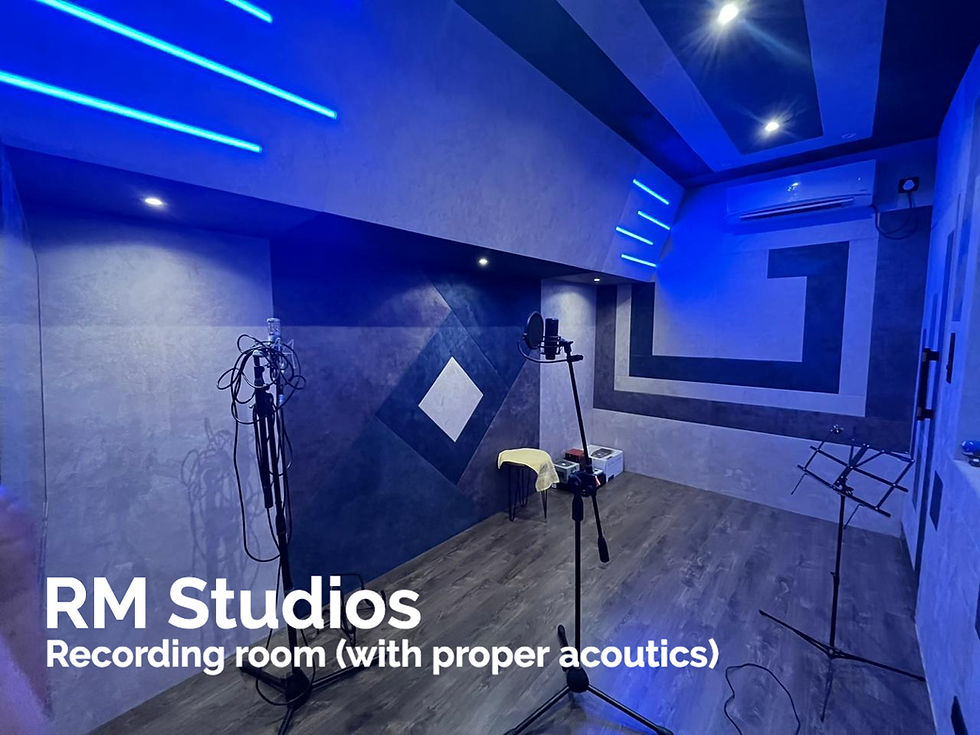INVEST in these 2 things to become a successful music composer PART 2!
- Keerthi Vasan

- Aug 24, 2024
- 3 min read
Updated: Sep 19, 2024
As we have discussed the importance of STUDIO MONITORS(Speakers) in previous blog post.
We will discuss the importance of ACOUSTICS in this blog post!
Studio acoustics refers to the design and treatment of a recording space to optimize sound quality. This involves controlling how sound waves interact within the room to achieve accurate monitoring, balanced frequency response, and optimal reverberation. Effective studio acoustics minimize unwanted reflections, standing waves, and external noise, ensuring clear, precise, and professional audio production. Proper acoustic treatment is essential for creating an environment where sound can be accurately captured, mixed, and mastered.

So, Acoustics is divided into two parts!
Sound proofing
Acoustic Treatment
1. Sound Proofing
Soundproofing is the process of preventing sound from entering or leaving a space by using materials and techniques designed to block or absorb sound waves. It is essential in studios to isolate recordings from external noise and prevent sound leakage that could disturb neighbouring areas.
Soundproofing typically involves adding dense materials like acoustic panels, mass-loaded vinyl, and specialised doors and windows to reduce sound transmission and create a controlled audio environment.
Noise Isolation: It prevents external noises, such as traffic or neighboring activities, from entering the studio, ensuring a clean recording without unwanted background sounds.
Privacy and Confidentiality: Soundproofing keeps studio sessions private, preventing sound from leaking out and disturbing others or being overheard.
Audio Integrity: By eliminating external noise, soundproofing ensures that what you hear and record inside the studio is purely the intended audio, leading to better sound quality.
Professionalism: A well-soundproofed studio reflects a professional setup, enhancing client confidence and satisfaction.
Legal and Ethical Compliance: In residential or shared spaces, soundproofing is often necessary to comply with noise regulations and respect the surrounding environment.
Before going into the next part, Check out our DIPLOMA Certified courses (Central Government) on our homepage https://www.rmmusicstudios.net/ . For more information regarding our courses feel free to contact +91 9384674211 or mail us at rmschoolofmusic@gmail.com
Thank-you!
2. Acoustic Treatment
Acoustic treatment involves using materials like absorbers, diffusers, and bass traps to control sound reflections, reverberation, and standing waves within a room. Unlike soundproofing, which blocks sound, acoustic treatment optimizes how sound behaves inside the space, ensuring accurate audio playback and recording. This is crucial in studios to achieve a clear, balanced, and precise sound environment for mixing and mastering.

Accurate Sound Reproduction: It ensures that sound is heard clearly and accurately, allowing for precise mixing and mastering by minimizing distortions caused by reflections and standing waves.
Balanced Frequency Response: Proper acoustic treatment helps maintain a balanced sound across all frequencies, preventing certain tones from being overly emphasized or diminished.
Controlled Reverberation: It manages the reverberation time, ensuring that the room doesn’t sound too echoey or too dead, which is essential for a natural and professional sound.
Improved Sound Quality: Acoustic treatment enhances the overall sound quality of recordings, making them clearer and more polished by reducing unwanted noise and echoes.
Comfortable Listening Environment: It creates a comfortable space for long studio sessions, reducing ear fatigue and enhancing the overall creative process.
So to make proper judgements in your studio, you need both good Studio speakers & appropriate Acoustics treatment that compliments those speakers!
Check out our post regarding Studio Speakers in case you have missed it!
Thank you!
_edited.jpg)






Comments